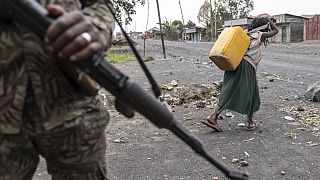Democratic Republic Of Congo
The Democratic Republic of Congo’s National Institute for Biomedical Research (INRB) has said a drug used for the first time on Ebola patients, the mAb114, is working well in North Kivu. It said it expects some patients to leave hospital on Tuesday August 21.
Professor Jean-Jacques Muyembe, the INRB’s director-general said 10 Ebola patients had received mAb114 in Beni and that they are waiting for its US manufacturers to deliver more doses this week.
“Until now 10 people have already received this treatment (mAb114) via infusion, it’s an hour of treatment, one injection and until now all 10 are getting better and I think Monday or Tuesday the first case will leave the hospital,” said Muyembe.
Muyembe said another five treatments that have been approved by the WHO including Zmapp, Regeneron, Remdesvir and Favipiravir should also be available.
The patients receiving mAb114 have been closely monitored and no side effects have yet been identified although he added it was too early to tell.
The mAb114 treatment was developed in the United States from a blood sample of an Ebola survivor in Kikwit, DRC, in 1995 and was 100 percent effective when tested on monkeys.
Muyembe said if the treatment was fully effective the fight to control the spread of Ebola in North Kivu could move from containment to cure.
On Sunday August 19, the health ministry said they had a total 64 confirmed Ebola cases in North Kivu and that 50 Ebola patients had died since the start of the breakout.
But security is hampering the health workers’ access to areas defined as ‘red zones’ where it is too dangerous to vaccinate contacts of Ebola cases and suspected cases.
As of 15 August, nearly 1,600 contacts, including more than 120 health workers, in North Kivu and Ituri provinces have been registered and are being followed up on a daily basis, the WHO in Geneva said.
“This epidemic (in north Kivu) is going to bring a lot of surprises. It is not like the epidemic in the Equator that we have known already. This epidemic will bring with it a lot of surprises: the number of cases is going up and the number of infected zones is increasing so it will take a long time to control this epidemic and for the anti-virals which the companies will provide us, they are ready to increase the doses,” said Muyembe.
There have been renewed campaigns to raise awareness and inform the public on how to protect themselves.
Reuters











Go to video
Kinshasa reacts to Trump's claim that 'many' Congolese come to US
01:02
Kabila plans return to DR Congo amid growing crisis
Go to video
Three American citizens who attempted coup in DRC back in US custody
Go to video
South Sudan calls US visa revocation unfair, cites mistaken identity
Go to video
Dozens dead, homes destroyed in flooding in the DR Congo capital
Go to video
Congo commutes death sentences of 3 Americans convicted in failed coup